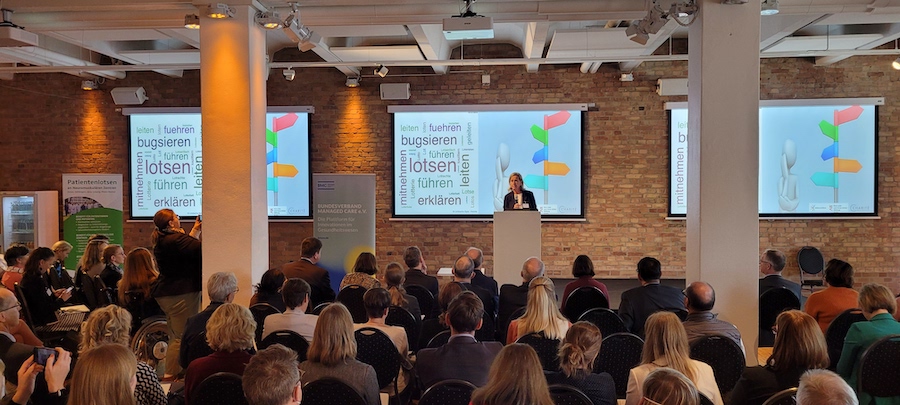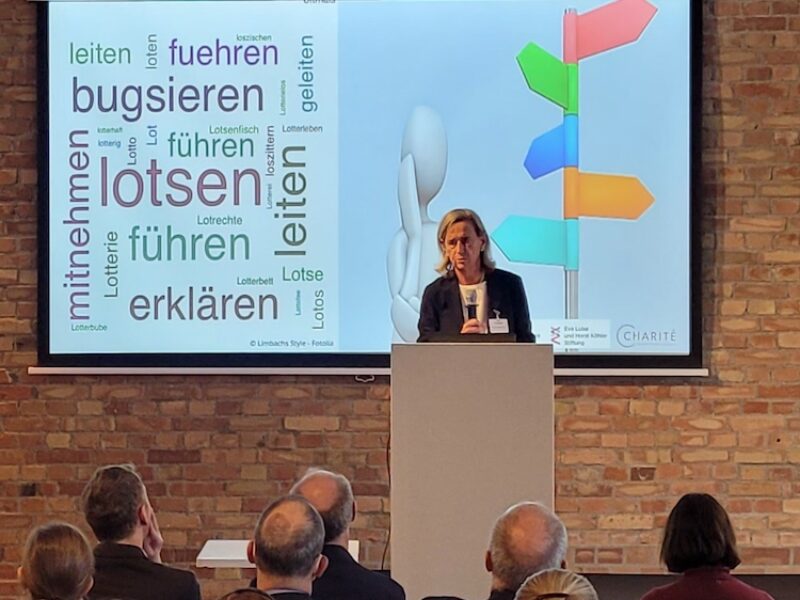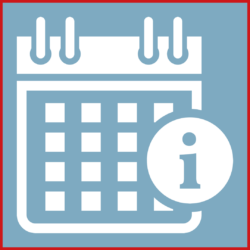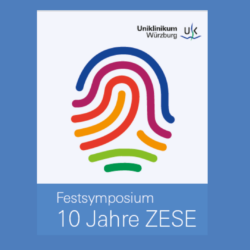Das Versorgungsmanagement von Patientinnen und Patienten mit chronischen und besonders auch Seltenen Erkrankungen ist sehr komplex. Oft stoßen Betroffene und Leistungserbringer an die Grenzen der Sektoren. Um Diagnostik, Therapie und Versorgung zu überblicken, braucht es eine Systemkompetenz, die Betroffene häufig überfordert. Unter-, Über- oder Fehlversorgungen sind die Folge.
In diese Lücke stößt das Konzept der Patientenlotsen: Sie unterstützen hilfsbedürftige Menschen mittels Case und Care Managements individuell und gezielt in ihrer jeweiligen Lebenslage. Mehr als 45 Patientenlotsen-Projekte gibt es inzwischen bundesweit, die in unterschiedlichen Indikationen mehr als 75.000 Menschen mit komplexen Lebenslagen unterstützen. Am 20. Oktober 2022 trafen sie sich erstmals im Rahmen des „Tags der Patientenlotsen“ in Berlin zum gemeinsamen Austausch, zum Vernetzen und zur Diskussion, wie der Weg in die Regelversorgung gelingen kann.
Prof. Dr. Annette Grüters-Kieslich, Vorsitzende der Eva Luise und Horst Köhler Stiftung für Menschen mit Seltenen Erkrankungen war gerne der Einladung der Deutschen Gesellschaft für Muskelkranke (DGM), der Stiftung Deutsche Schlaganfall-Hilfe, der Deutschen Gesellschaft für Care und Case Management (DGCC) sowie des Bundesverbands Managed Care (BMC) gefolgt, im Rahmen eines Vortrags vor rund 150 Gästen aus dem Gesundheitswesen die Lotsentätigkeit aus Sicht der Seltenen Erkrankungen einzuordnen und zu erläutern.

Für die renommierte Kinderärztin steht fest: „Ausgang aller Überlegungen muss die Frage sein: Wie kommt jede Patientin, jeder Patient zu seiner individuell bestmöglichen Versorgung?“ Professor Grüters-Kieslich verwies in diesem Zusammenhang auf den Friedensnobelpreisträger und Kardiologen Bernard Lown, der in seinem Werk `Die verlorene Kunst des Heilens‘ festgehalten hat: „Einige der herausforderndsten medizinischen Probleme, denen ich begegnet bin, konnten allein durch die Information, die der Patient lieferte, gelöst werden.“ Tatsächlich sei richtiges Zuhören zentral für eine gute Patientenversorgung, so Grüters-Kieslich. Von dem, was Patientinnen und Patienten erzählen, könne man oft weitaus mehr Informationen erhalten als von Laborbefunden und Testergebnissen. Sie betonte, dass die persönliche Betreuung der Patientinnen und Patienten eine multiprofessionelle und interdisziplinäre Aufgabe sei, die auf mehrere Schultern verteilt werden müsse. Hier kämen die Lotsen ins Spiel, die Prof. Grüters-Kieslich als wichtige „Kümmerer“ bezeichnet. Denn anders als der Lotsenbegriff vermuten lassen kann, sollen sie Patienten nicht leiten und führen, sondern vielmehr begleiten und ihnen Wege eröffnen.
Die Vorsitzende der Eva Luise und Horst Köhler Stiftung verwies in diesem Zusammenhang auf das Innovationsfonds-Projekt TRANSLATE-NAMSE, in dem durch koordinierte Zusammenarbeit von Zentren für Seltene Erkrankungen die Diagnosestellung deutlich beschleunigt werden konnte. Teil der Koordination war neben Fallkonferenzen und strukturierten Behandlungspfaden auch der Einsatz von Lotsen. Besonders beeindruckend sei die hohe Zufriedenheit der Patientinnen und Patienten gewesen, die von Lotsen begleitet wurden, betonte Prof. Grüters-Kieslich: “Allein das Wissen, da sind Menschen, die sich um mich kümmern, macht für die Betroffenen einen wirklichen Unterschied.“ Sie appellierte an alle Verantwortlichen, nun mit Nachdruck die vom Gemeinsamen Bundesausschuss im April 2022 empfohlene Überführung der Projektinhalte von TRANSLATE-NAMSE in die Regelversorgung umzusetzen, denn die Patientinnen und Patienten hätten keine Zeit: „Täglich sterben in Deutschland Kinder und Erwachsene, weil sie nicht rechtzeitig die für sie notwendige Versorgung erhalten haben. Das kann und darf nicht sein.“



